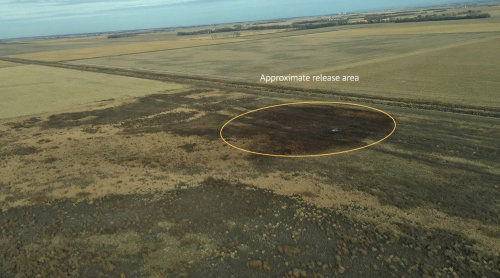News | November 20th, 2017
 LINCOLN, NEBRASKA – Nebraska regulators passed the $8 billion Keystone XL Pipeline project Monday morning.
LINCOLN, NEBRASKA – Nebraska regulators passed the $8 billion Keystone XL Pipeline project Monday morning.
After leaking more than 210,000 barrels of crude oil from Keystone I into the South Dakota prairies, TransCanada, the company behind the 1,200-mile pipeline, was approved for building a second pipeline, the Keystone XL, in Nebraska. Keystone XL has been a controversial project, facing fierce opposition by environmental groups, landowners, and Native American Tribes.
The TransCanada-managed pipeline was also stopped by valve turners in October 2016, in what became known as the most expansive, coordinated, takeover of fossil fuel infrastructure ever attempted in the U.S.
President Barack Obama once vetoed the Keystone XL Pipeline, and President Donald Trump breathed new life into the project earlier this year, when he signed executive orders approving the project.
The Nebraska Public Service Commission approved the project with two dissenting votes. According to state law, regulators are not allowed to consider the risks of pipeline accidents during permission proceedings. The decision can be challenged in court.
Such pipelines are called “black snakes” by Indigenous tribes in the United States, as they believe their prophecies foretell such pipelines will ruin the environment.
“The Commission is very cognizant of the fact that opening a trench that entirely bisects the State of Nebraska from north to south to insert a 36-inch pipe will have impacts on the natural resources of the state, including soil, water, and wildlife,” the Commission reported. “It is impossible to complete such a project without impacts. There is no utopian option where we reap the benefits of an infrastructure project without some effects.”
The project will benefit union members and Nebraska residents, and will create about $30 million in wages and $20 million in fringe benefits, according to testimonies within the report. Land in which the pipe will be laid is primarily agricultural in use, the report stated.
Commissioner Rod Johnson, who voted for the project, said TransCanada, the managerial company for Keystone I and Keystone XL, made promises to the state that he will make sure the company keeps.
“There should be no doubt that this Commission and the citizens of this State expect TransCanada to keep those promises, and we will be watching to make sure that they do so,” Johnson said. “I fully understand that Major Oil Pipeline Siting Act [MOPSA] forbids this Commission from considering issues related to pipeline safety. Nonetheless, it is obvious that safety issues are of prime concern to the public regarding this pipeline. Safety was the number one issue raised at the Commission’s four public meetings and in the many thousands of written comments we have received during this process.
“TransCanada and project advocates have often said that the Keystone XL pipeline will be the safest in history. Nebraskans are counting on that promise, too.”
Not all the regulators agreed the Keystone XL project should have gone forward. Two commissioners, Mary Ridder and Crystal Rhoades, dissented, saying the burden of proof of public good was not met. Three men on the commission board, not including the executive director, Michael G. Hybl, voted for the project.
“The Commission failed to protect the due process rights of groups affected by this proceeding,” Rhoades said. She listed a number of violations, including that the route chosen violates due process landowner rights, that the applicant did not provide proof of publication in local newspapers along the pipeline’s route, and that she disagreed with decisions made during the proceeding.
“All human-made infrastructure degrades and fails over time,” Rhoades said. “No infrastructure ever designed has lasted an eternity and there is no reason to believe this pipeline will be an exception. Therefore, it is impossible to prepare beforehand for environmental impacts; and it will expose first responders, with limited resources, to unknown chemical compounds they may not have the necessary equipment to contain.”
Furthermore, no evidence was presented to substantiate that the applicant would minimize or mitigate potential impacts on natural resources, Rhoades said, and the company also failed to speak with local Native American tribes.
“The applicant only reported DOS [U.S. Department of State] had worked with the Southern Ponca Tribe, who reside in Oklahoma. This is the equivalent of asking a distant relative for permission to do major construction in your backyard. This is inadequate as it is unreasonable.”
Keystone XL employees also did not offer any evidence that the “man camps” along the pipeline’s route would not create a strain on local resources in terms of fire, police, sanitation, demands for power, and public safety, a recurring problem that North Dakota’s Bakken oil region also faced and still faces today.
News of pipeline project’s passing was good for North Dakota Senator John Hoeven.
“After nearly a decade of delay, the Keystone XL Pipeline is now moving again,” Hoeven said. “This pipeline project is important energy infrastructure for our nation that will create jobs and economic growth and make our nation more secure by reducing our dependence on Middle Eastern oil. Building newer and better infrastructure is safer and will provide our country with the infrastructure we need now and in the future.”
Dallas Goldtooth, of the Indigenous Environmental Network, said the fight against TransCanada and the Keystone XL Pipeline is far from finished, and launched a website NoKXLpromise.org to help mobilize those who want to fight against the pipeline.
“Our commitment has always been to protect the sacred,” Goldtooth said. “From the source at the Tar Sands to the ports on the coasts, we stand by this commitment and continue to fight to keep fossil fuels in the ground.”
“We are pushing Mother Earth to the limit everyday and the KXL is just another oil and gas project that is locking us into a future we can't afford,” Eriel Deranger, the executive director of Indigenous Climate Action, said.
“To hear that Nebraska is moving forward with this black snake, while a massive spill is being cleaned at this very moment, is heartbreaking,” Joye Braun, a registered member of the Cheyenne River Sioux, and with Indigenous Environmental Network, said. “We have not yet received information on the toxic chemicals that were released in this most recent spill, nor do we know where the contaminated soil is going to go. Spills like this have huge social impacts and our communities cannot afford this to happen. When it comes to KXL, it is a matter of when, not if the pipeline leaks.”
Lewis Grassrope, headsman of the Wiconi Un Tipi, said he has set up camp in the Lower Brule Sioux Nation in South Dakota in response to TransCanada’s “attempt to affect our living and way of life.
“Our camp is close to the proposed transmission lines for the KXL pumping stations,” Grassrope said. “We are here to choose how we live. We are here to continue to restore balance and save Mother Earth from any atrocious acts against her.”
June 9th 2025
April 30th 2025
April 24th 2025
April 23rd 2025
April 21st 2025
__293px-wide.jpg)
_(1)__293px-wide.jpg)

__293px-wide.jpg)
__293px-wide.jpg)
